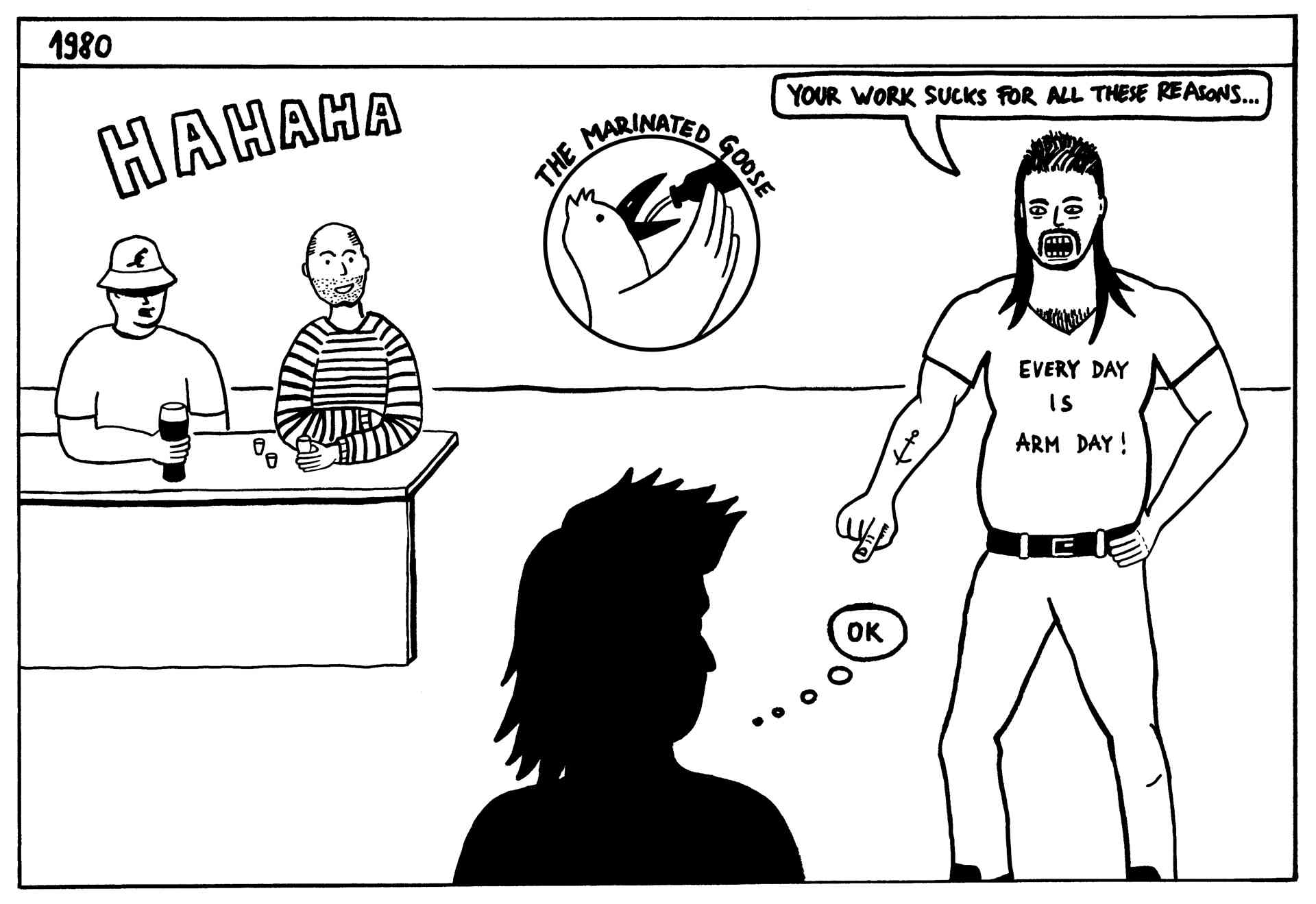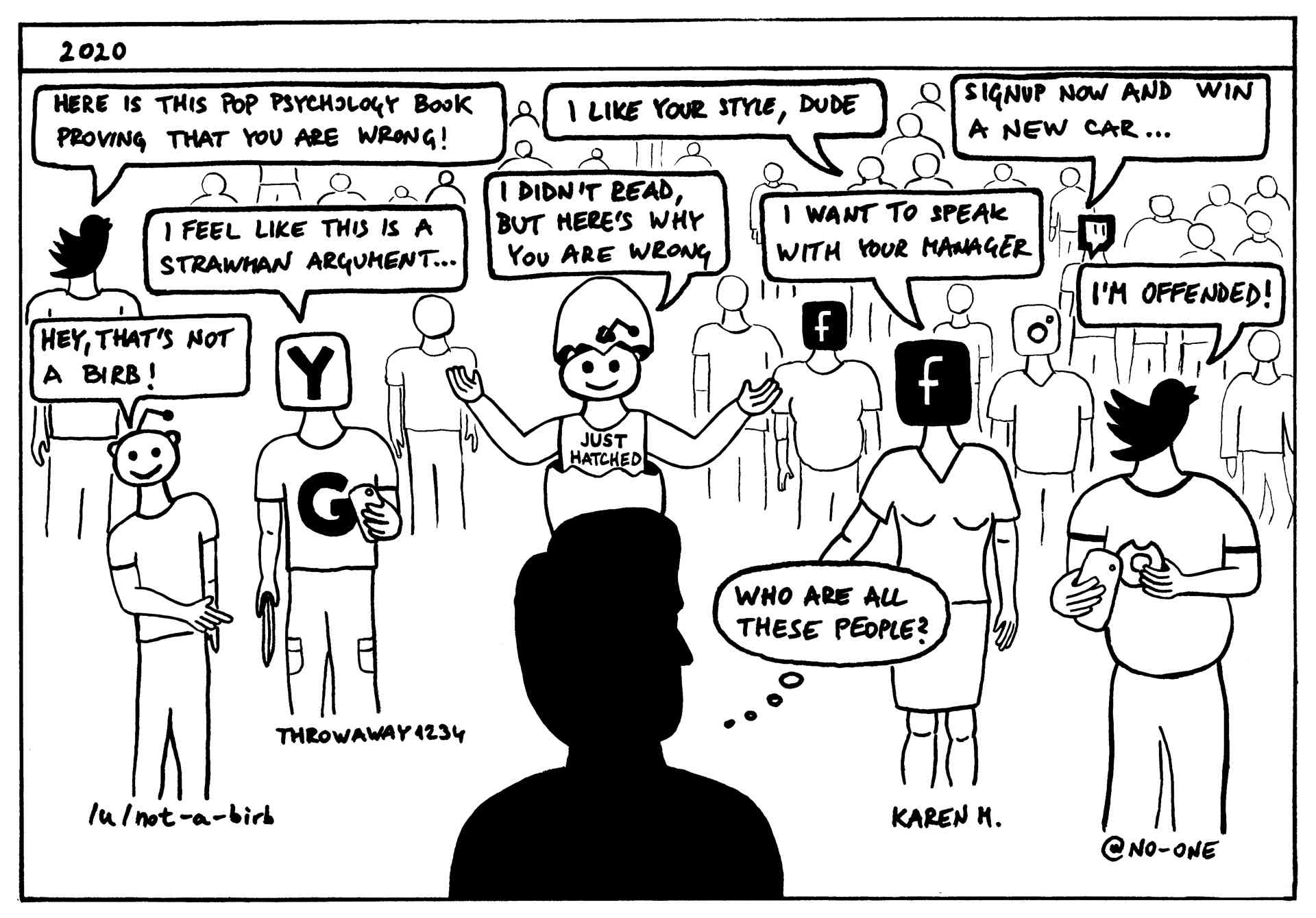One of the most important inventions of the 20th century is definitely the World Wide Web, or as we call it nowadays - the internet. Suddenly people all over the world were able to share their knowledge and opinions on any topic. Best of all, everyone was able to participate in this mess of interconnected links, since the technology by itself does not discriminate. Even that slightly crazy neighbor, who lived in a round house due to seeing a conspiracy lurking behind every corner, was able to add his voice into the mix.
But connecting the world has also uncovered some unanticipated problems. If you’ve ever been in a bar discussion with lots of participants, you have probably learned about the law of large groups; the larger the group, the higher the chance that people are going to disagree and steer the discussion into irrelevant territory and personal insults. Usually the big group of people behind the table is divided into smaller groups whose members go along well, but these members are often not fond of one or several people that belong to another group. With the advent of the internet, these bar debates are larger than ever, which in turn causes lots of heated discussions about insignificant issues.
Imagine for a second that you are a fiction writer in the ’80s who is, like all aspiring artists, struggling to make the ends meet with your craft. After a year of sleepless nights and weekends, however, you are finally done with your story about the space plumber. All 300 pages are stashed in a manilla envelope and ready to be published. Although most of the work is already done, you are still not quite ready to celebrate such an important milestone of your life. A tiny thought is gnawing at your brain, telling you that the story is too convoluted and the readers won’t like it.
The only way to confirm your doubts, is to gather a few reliable book worms that will read your manuscript and provide you with valuable feedback. Nothing easier to do than going into your favorite bar and asking your drinking buddies for help. Their feedback, however, will not always be useful. Some will try to argue with you that a space plumber would never say such and such things, some will prepare a long list of criticisms starting with a cover illustration being worse than what their 2 year old daughter could come up with, while others will keep their thoughts to themselves to avoid hurting your feelings.

Even though this kind of feedback gathering process is far from being perfect, as many will advise you to not ask your friends and family for opinions, the amount of criticism that you will receive will be low and of high quality. Not due to your work being flawless, but mostly because your chosen readers will genuinely want to help you and will consequently put in some effort when formulating their criticisms. In case you’ve managed to write about some nonsense, like how gravity was invented to sell physics textbooks, that nonsense will also stay within the local drinking community.
Now, let’s fast forward to the roaring twenties of the 21st century. You are still an aspiring writer, still struggling to make the ends meet and still trying to publish your story. The only difference between then and now is the ever present technology. Since publishing has become easier than ever, you have decided to write your story in parts and publish it on the internet. That way you could get valuable feedback from several readers before the book is fully written. With some luck your story might become viral, which could set you up for a great deal with an important publisher. One could only dream.
In reality, there are two most likely outcomes of such a widespread opinion gathering. Either nobody will care, because the internet is saturated with stories from aspiring writers, or an internet’s shit storm will happen during which a bunch of random people will feel inspired to tell you how wrong you are about everything. Some will even find a way to feel offended, because your story will remind them of whatever personal insecurities they happen to have. In case you’ve managed to write about some nonsense, like the aforementioned gravity conspiracy theory, this local stupidity will not be confined, laughed about and forgotten in a no-name bar. Instead, it will be propagated for the world to see.

One could argue, however, that a writer who is not prepared to face criticism should avoid publishing their work; people living in glass houses shouldn’t be throwing stones and yadda, yadda. Nevertheless, criticism itself is not necessarily a bad thing. Learning involves being wrong and by having your work criticised, you get better at your craft.
The problem with the internet residents delivering their honest opinions, is that these comments are coming in from a firehose and they are mostly made with a relatively low amount of effort. In the age of snail mail, sending your thoughts demanded quite some work to be done on your part: you had to find an envelope, a stamp, a pen, a piece of paper and the author’s address. The technology pushed past these barriers and anyone with an internet access and 10 seconds can turn into an expert critic on any subject, or send a ridiculous message to the president of their country. What a time to be alive.
Proliferation of experts on the internet is especially visible when one is trying to learn more about an unknown subject. If the article is posted on a website that supports comments, you will often encounter conflicting opinions in that section with no way to verify which one is correct. The author of such a widely discussed article can guess fairly easily who has a skin in the game and who is an overconfident nutjob. After all, they have spent at least a couple of hours writing, researching and thinking about the topic. For the uninitiated, however, a fool and a wise man in the comments may all sound the same.
Given enough eyeballs, all articles will contain some problems that bored readers can complain about. Either there is an honest mistake, a typo, an incorrectly used figure of speech, or a broad argument that everyone knows is true yet someone might point out an edge case which the argument doesn’t cover. Most of these voices, however, don’t add anything to the discussion, except for dog-piling on the poor writer.
Humans are for some reason naturally evil and prone to go with the pack against the weakest link from the very beginning. I remember from the early years of primary school when kids played a game called a live mountain. Whenever someone fell or was tackled and was laying on the floor, a bunch of kids jumped on them to form a mountain of human bodies. Everybody who ever found themselves at the bottom of the pile knew how unpleasant it is to be there, yet most males kept participating in this game. When half of the class participates in such an activity, you can’t really claim that human wickedness is a taught behavior, but I digress.
The type of nitpicking behavior that I mentioned earlier, is especially problematic since it often causes the loss of writer’s authenticity. With time, these criticisms cause one of the following:
- The writer stops publishing their work.
- The writer stops reading comments and minds their own business.
- The writer learns their lesson and sands off their edges in order to fit better in the society du jour.
The larger the writer’s audience, the more likely it is for the writer to pick the last option and tone down their voice. You can experience this situation first hand when reading the essays of prominent bloggers. Their early work is usually interesting and fun to read, which naturally brought a large audience to their doors. But the more the show goes on, the more they will waffle around the topic, since with a large enough audience every thought will be misunderstood and nitpicked mercilessly. Naturally the writer is emotionally invested in their work, therefore they feel obliged to defend against the barbarian hordes that are throwing bricks at their little glass house.
The only way to defend against such a large number of different minds is to pick a more nuanced approach in order to please all sides of the argument. As a consequence of that, your texts become a meandering of different ideas, references, endless footnotes and social media links to one lined aphorisms that are supposedly confirming your point. Considering that reading such texts is as pleasant as having your teeth drilled, you end up not pleasing anyone and the world is left with one less original writer.
This newfangled form of writing is in stark difference with the work of pre-internet writers. If you take a look at essays of Bertrand Russell, you will be pleasantly surprised how little meandering is happening in them. Here and there he refers to a specific book from the past, but other than that he is mostly coming up with ideas on the spot without trying to back them up with hundreds of references. While it’s not really fair to compare one of the most prominent thinkers of the 20th century with a random blogger, to reach the clarity of Russell’s writing is still something writers should be striving for.
Considering how the internet affects our behavior, I wonder how many books and articles that go against the grain are stashed away in some writer’s drawer just to avoid the unwanted media attention that may, in some cases at least, even hurt their career. That too, is the price to pay for connecting the world.
This post has a part II: Citation needed.